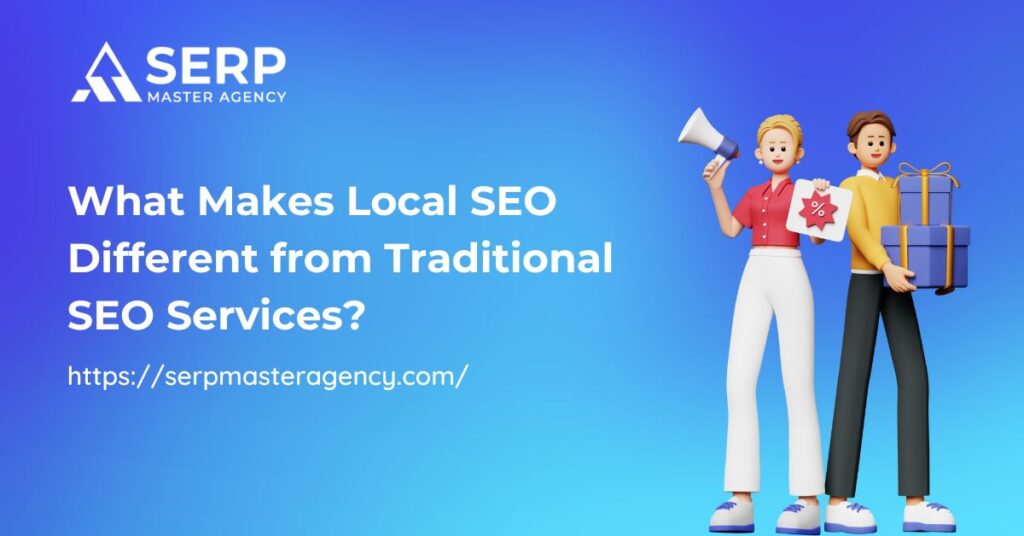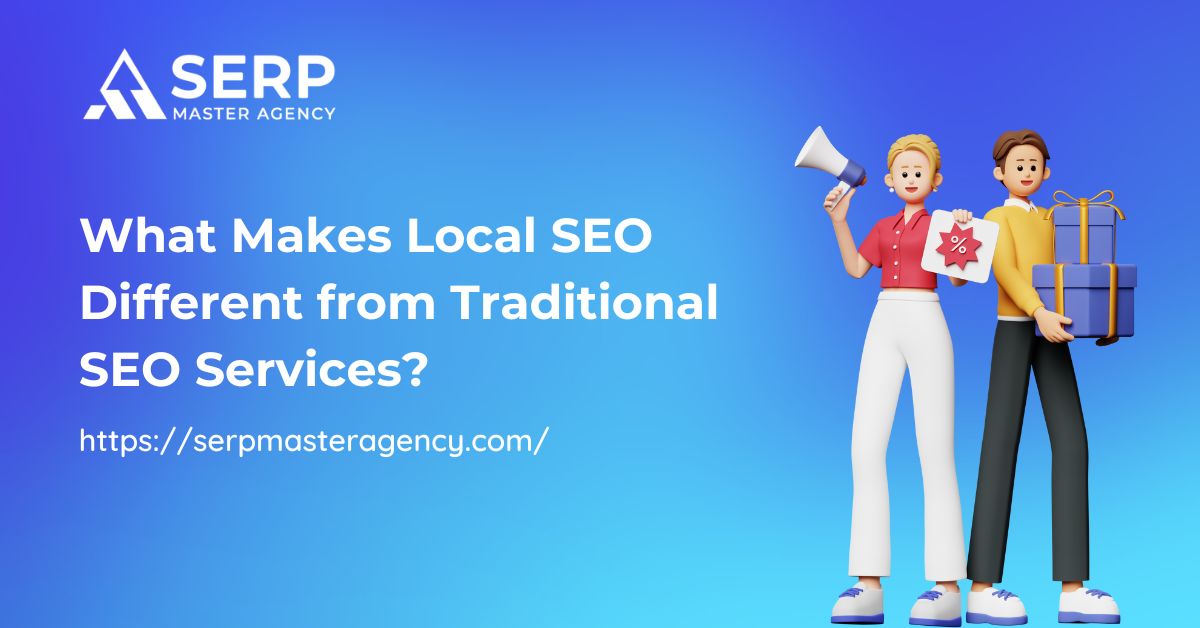Have you ever searched “coffee shop near me” and noticed some places pop up instantly at the top with star ratings and maps? That’s not random.
It’s the result of something called Local SEO. While both local and traditional SEO help businesses show up online, they do it in different ways.
This article will explain those differences in a simple and clear way, so you can decide which approach makes the most sense for your business.
What Is Traditional SEO and How Does It Work?
Targeting a Broad Audience
Traditional SEO is about helping websites get found by people from anywhere. It’s ideal for businesses that don’t rely on location.
For example, a food blog with healthy recipes might want visitors from across Australia, the U.S., and even Europe.
These websites don’t need to show up for a specific city—they just want more views from interested readers worldwide.
At SERP Master Agency, we support businesses like these by using strategies that help them reach a wider audience beyond their local area.
Focus on Keywords and Website Quality
The success of traditional SEO depends heavily on the use of the right keywords and how good the website is.
Search engines like Google look at things like how fast the site loads, whether it works well on mobile, how often it’s updated, and if it has high-quality links pointing to it.
A common keyword in traditional SEO might be “best running shoes” or “how to lose weight.” There’s no location tied to the search, so the goal is to outrank others with the same topic—no matter where the searcher is located.
What Is Local SEO and Why Is It Important?
Reaching Nearby Customers
Local SEO helps businesses appear in search results based on their physical location. It focuses on reaching customers in a specific area.
Let’s say there’s a dentist in Wollongong. When someone nearby types “dentist near me” into Google, Local SEO helps that dentist appear in the top results. This is useful for anyone offering services to a local community.
Google Maps and Local Listings
Local SEO uses Google Maps and local listings to connect businesses with nearby customers. If someone searches for a hair salon in their suburb, they’ll often see a map with business names, phone numbers, opening hours, and reviews.
These listings are pulled from Google Business Profiles, which are a big part of local SEO. This makes it easy for people to find and contact your business quickly.
How Local SEO Helps Small Businesses
Small businesses benefit the most from Local SEO because they usually serve a limited area.
A plumber in Perth doesn’t need traffic from Brisbane or Melbourne. Instead, they need people nearby to find them.
Local SEO gives smaller businesses a fair chance to compete with bigger companies by focusing on location-based searches.
Key Differences Between Local SEO and Traditional SEO
Geographic Targeting
One of the biggest differences is the area you want to reach. Traditional SEO is all about getting noticed by anyone, anywhere.
That makes it ideal for online stores or blogs. Local SEO, on the other hand, is used by businesses that only want customers from their city, suburb, or local area.
It’s designed to help you show up in search results where it matters most—close to your shop or office.
Keywords With Location
Traditional SEO uses general keywords like “best yoga mat.” In contrast, Local SEO adds a location to the keyword, like “yoga mat shop in Adelaide.”
Including your city or suburb in your keywords helps people find you when they’re nearby and searching for your product or service.
Google Business Profile
Your Google Business Profile plays a major role in Local SEO. It shows important details like your address, phone number, website, business hours, and customer reviews.
This information appears when someone searches for a business like yours in your area. Keeping this profile accurate and up-to-date improves your chances of ranking well locally.
Online Reviews and Ratings
Reviews are essential in Local SEO. People often trust businesses with good ratings and detailed feedback.
Google also considers these reviews when deciding which businesses to show first. The more positive reviews you have, the better your visibility and reputation.
Local Citations
A local citation is when your business is mentioned on other websites, like directories, with your name, address, and phone number (NAP).
The more consistent and accurate these mentions are, the more Google trusts your business. If your information is different across websites, it can hurt your rankings.
Backlink Strategy
Traditional SEO focuses on getting links from well-known blogs, news sites, or educational pages.
Local SEO puts more value on links from other businesses in your area, local newspapers, or regional directories. These local backlinks tell search engines that you’re active and relevant in your community.
Tools and Strategies Used for Each Type
Traditional SEO Tools
Tools like Google Search Console, Ahrefs, and SEMrush are often used in traditional SEO. They help track keyword performance, website traffic, backlinks, and technical issues.
These tools are useful for monitoring overall site health and helping with long-term strategy for reaching a wider audience.
Local SEO Tools
For local SEO, tools like Google Business Profile Manager, BrightLocal, and Moz Local are more useful.
They help businesses track how they appear on maps, monitor reviews, and check that local listings are accurate. These tools are built to help businesses stay visible in their specific region.
Example of How a Strategy Changes
Let’s say two businesses sell shoes. A national shoe brand may write blog posts like “Top 10 Tips for Caring for Your Shoes” to attract a broad audience.
Meanwhile, a local shoe store in Melbourne might focus on ranking for “Melbourne CBD shoe repairs” to draw in people nearby who are ready to visit.
Why Local SEO Is a Smart Move for Small and Medium Businesses
Better Results With Less Competition
Ranking for broad keywords like “pizza” is difficult because large companies with big budgets are already on top.
But “pizza shop in Newcastle” is easier to target. Local SEO lets smaller businesses compete effectively without needing huge resources.

Mobile Search Growth
More people use their phones to search on the go. Phrases like “near me” have become very common.
Local SEO helps you appear in these searches, especially when people are ready to make quick decisions while outside or travelling.
Higher Chance of Conversions
When someone types “emergency plumber near me,” they’re not just browsing—they need help now.
Local SEO puts your business in front of these ready-to-act customers. This means you’re more likely to get calls, bookings, or store visits right away.
How SERP Master Agency Helps With Both
At SERP Master Agency, we support businesses of all sizes by using the right SEO strategy for their goals.
Whether it’s building a strong national presence or improving visibility in a local suburb, we work to connect businesses with the people who need them.
Choosing the Right Approach for Your Business
When Traditional SEO Makes Sense
If your business sells digital products, runs an online course, or publishes articles for a wide audience, traditional SEO is the right fit. It helps you grow by attracting readers or customers no matter where they live.
When Local SEO Is the Better Option
If you run a physical shop or provide services to nearby homes and businesses, local SEO is more effective. It helps you get found by people nearby—those who are most likely to become customers.
Sometimes You Need Both
Larger businesses with multiple branches may benefit from combining both strategies. For example, a national brand can use traditional SEO for overall visibility, while each local store uses Local SEO to attract customers in its own area.
Ask the Right Questions
Before choosing an approach, ask yourself: Who are your ideal customers? Where are they located? Do they search online before visiting your business? Your answers will guide the SEO method that suits your needs.
Comparing SEO Efforts: Real-Life Example
Traditional SEO Case: Online Course Business
An online learning platform offering coding classes uses traditional SEO. They publish how-to guides, attract backlinks from tech sites, and target search terms like “learn Python at home.” Their audience isn’t tied to one place—they want people from anywhere to sign up.
Local SEO Case: Veterinary Clinic in Ballarat
A local vet creates a Google Business Profile, adds photos of the clinic, and gets customer reviews. They focus on keywords like “Ballarat vet near me.”
This strategy brings in more local pet owners who are looking for nearby services, not general pet advice.
Challenges in Local SEO That Don’t Happen in Traditional SEO
Fake Reviews or Inconsistent Info
Sometimes, fake reviews or outdated contact details can hurt your local rankings. That’s why it’s important to regularly check your business listings and respond to feedback. Local SEO needs more attention to accuracy and reputation management.
Limited Audience
You might get less traffic with Local SEO, but that’s okay. The goal isn’t just getting views—it’s getting the right views.
A few visits from people nearby can be more valuable than hundreds from people far away who aren’t likely to become customers.
Overlooked Elements Like Photos
Many people want to see what your place looks like before visiting. Photos of your storefront, waiting area, or team can build trust and comfort. It’s a simple step, but one that’s often missed in local strategies.
The Role of an SEO Company in Both Approaches
How an Expert Can Help
An SEO Company helps match your goals with the right strategy. They understand how to use the right tools, set up tracking, and improve visibility—whether you’re trying to reach a city or a whole country. This saves time and helps you avoid mistakes that can delay progress.
Avoiding Common Mistakes
Many business owners forget to claim or update their Google Business Profile. Some don’t monitor their reviews or keep their info consistent across websites.
A trusted SEO team makes sure everything stays up-to-date, and they can even help with earning local backlinks or writing location-based content that improves rankings.
Conclusion
Local SEO and traditional SEO both have important roles in helping businesses grow online. The difference is in who you’re trying to reach.
Local SEO is perfect for service providers and local shops that want customers from their area. Traditional SEO suits businesses that want traffic from all over the country—or even the world.
At SERP Master Agency, we help businesses choose the right SEO strategy and build strong, lasting results.
Whether you’re reaching customers across Australia or focusing on your own suburb, we’ll help you stand out where it matters most.

Suraj Rana is a highly regarded SEO expert specializing in the dental industry. His expertise lies in crafting strategic SEO marketing plans to help new or expanding businesses increase their online visibility and attract more customers. Suraj Rana’s skills extend to improving website rankings and boosting organic search visibility, thereby enhancing web traffic and return on investment for businesses.



